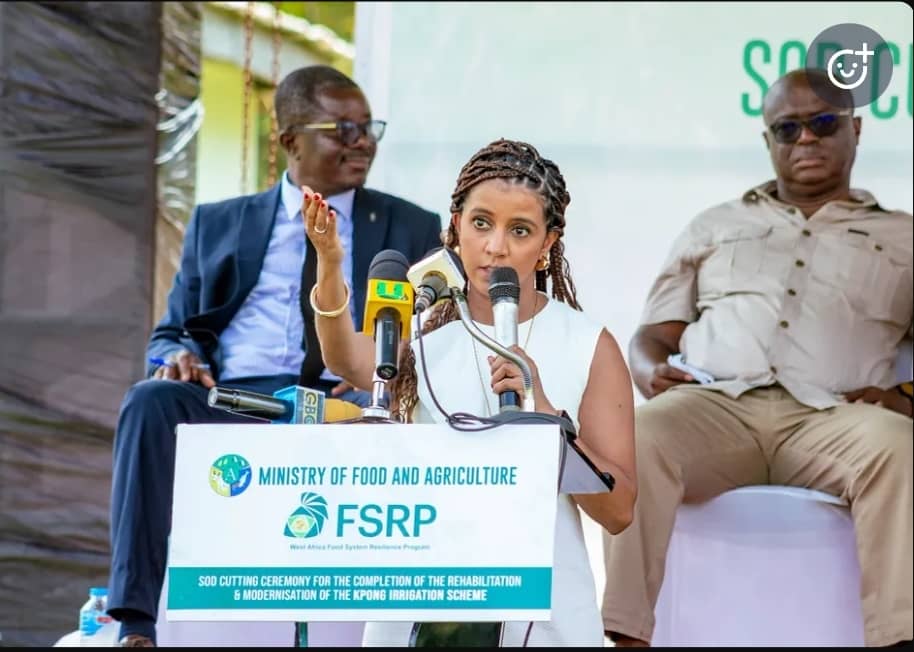Accra, Oct. 24, GNA – The West Africa Food System Resilience Project (FSRP) under the Ministry of Food and Agriculture (MOFA) has commenced construction works for the completion of the rehabilitation and modernisation of the Kpong Irrigation Scheme [KIS].
The project covers areas around Akuse and Asutsuare in the Eastern and Greater Accra Regions respectively.
The scope of rehabilitation works include the rehabilitation of the irrigation and drainage infrastructure; the installation of instrumentation and automation equipment for enhanced water delivery and management; rehabilitation of road networks; and the facilitation of the set up of improved management of the irrigation scheme.
The project is being carried out at a cost of US$22.6 million, with World Bank funding.
Dr. Bryan Acheampong, the Minister for Food & Agriculture, in a speech read on his behalf at the sod-cutting ceremony, said the first phase of the rehabilitation of the Kpong Irrigation Scheme was completed under the Ghana Commercial Agriculture Project (GCAP) between 2017 and 2021 and covered an area of 4000 hectares.
Its beneficiaries include at least 2000 smallholder rice farmers (mainly around the Asutsuare and Akuse environs); and Golden Exotic – a banana exporting company.
It also provides water for several aqua culture companies in Ghana for the production of tilapia and catfish.
The Minister said the project was a continuation of previous investments Government of Ghana through World Bank support made in the rehabilitation and modernisation of some major irrigation schemes in the country at a cost of over US$90 million between 2019 – 2021.
He said out of that amount, US$62 million was invested in the first phase of rehabilitation of Kpong Irrigation Scheme and the construction and expansion of Kpong Left Bank Irrigation Project in the North Tongu District in the Volta Region.
Dr Acheampong said the interventions demonstrated the Government’s commitment to build the resilience of food production and delivery systems across the country.
He said in addition to physical infrastructural developments, Government was facilitating enhanced value chain activities under the PFJ 2.0 using the input credit system linked to aggregator/ anchor farmer – small holder arrangement for technology dissemination and market access.
He called on all Ghanaians, especially the youth, to take advantage of the numerous opportunities under the PFJ 2.0 to build businesses in the agricultural sector.
Mr Richard Oppong-Boateng, Acting Chief Executive Officer of the Ghana Irrigation Development Authority (GIDA), thanked the Government for securing the World Bank facility towards the execution of projects under the Food System Resilience Program (FSRP), thus the Modernisation and Rehabilitation of the Kpong Irrigation Scheme.
He said it was expected that the full operationalisation of the Scheme would provide improved water use efficiency for the remaining 931 ha farming areas, which could not benefit under the phase one to increase crop production and food security.
The World Bank’s Task Team Leader for FSRP Ghana and West Africa, Ashwini Rekha Sebastian, advised project beneficiaries to take ownership of every aspect of the project implementation.
Ms Ashwini Sebastian, also a Senior Agric Economist of World Bank Ghana, said irrigation was just one phase of the agricultural value chain.

She said under FSRP, the World Bank would be supporting other value chain interventions, including the use of climate-smart seeds, adoption of innovative agricultural practices and marketing integration, among other interventions.
The West Africa Food System Resilience Programme (FSRP) is to increase preparedness against food insecurity and build resilience of food systems in Ghana, Togo, Burkina Faso, Mali, Niger, Chad, Sierra Leone, and Senegal.
FSRP Ghana is focusing primarily on the intensified production, marketing and consumption of wholesome Rice, Maize, Broiler Poultry, Soyabeans and Tomatoes.
To that end, preparations are fast advancing to construct or refurbish pivotal value chain facilities across the country, including: veterinary-based laboratories; plant-based laboratories; a seed bank; inner valleys; irrigation schemes; selected border posts; warehouses and markets (for cross-border bulk trade of rice, maize, soya and broiler poultry).
FSRP is also supporting anchor poultry farmers with input credit; and crop farmers with climate smart seeds and fertilizers; promoting innovative and smart technologies (which are climate-smart and youth/gender-sensitive); conducting pest and diseases surveillance; and installing Automated Weather Stations for agric-focused and location specific weather forecasts.
GNA